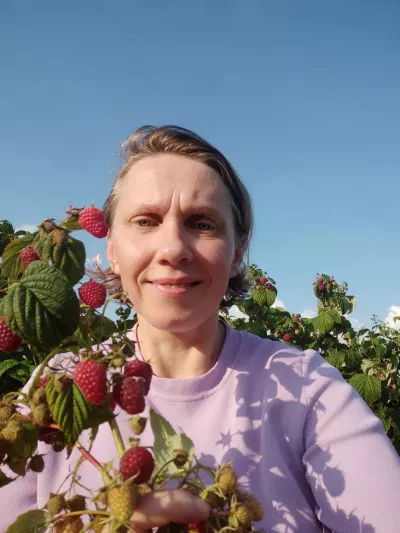Summary
An Operational Group from Lithuania called InoBerry aimed to improve the viability and competitiveness of high added-value by-products from berries. The project, which ended in 2023, tested and promoted a model which combines technological and commercialisation processes. It is based on sustainable management techniques as well as cooperation, creating links between farmers for more efficient production.
An Operational Group from Lithuania called InoBerry aimed to improve the viability and competitiveness of high added-value by-products from berries. The project, which ended in 2023, tested and promoted a model which combines technological and commercialisation processes. It is based on sustainable management techniques as well as cooperation, creating links between farmers for more efficient production.
The partnership, led by Vytautas Magnus University (VMU), included six berry producers, a second university, and a consulting company. The project took place in Kauno apskritis, a county in the centre of Lithuania, and the idea was to develop a model which could support berry production in all other regions.
The production of berries in Lithuania has been steadily increasing in recent years. Audrone Ispiryan, one of the participating farmers, explains why the project was so important:
Previously, farmers lacked knowledge about innovative production technologies and laboratory research that could enhance the added value of their berries. There was also a lack of awareness regarding commercialisation opportunities for by-products, which made it challenging for them to compete in both local and international markets. The project aimed to address these gaps by fostering collaboration between farmers and scientific institutions.
The berry producers were strongly involved in shaping InoBerry’s outcomes. As the farmers already have a deep understanding of their farm management and production processes, this ensured that the innovations developed were practical, sustainable, and beneficial for both the farmers and the broader agricultural community.
The project activities were carried out over four years. The first key phase was to conduct an in-depth analysis of the berry farming sector; this involved both technological assessments and market studies to determine the most viable products and their commercialisation strategies. The next phase was to conduct field tests and collect data to evaluate the new techniques and management models. The tests were carried out on numerous farms across different regions to ensure the new methods could be scaled and adapted to different areas, farm sizes, and types.
Innovative technologies were tested which enabled farmers to diversify their product ranges. An example is ‘supercritical CO2 extraction’, which is used to extract oil from berry seeds after juicing, without the need for chemicals. The process not only adds value to what was previously considered waste, but also allows farmers to produce high-quality, natural oils that can be used in cosmetics and nutraceuticals. They also introduced cooperative management techniques that encourage shared resources, equipment, and knowledge among farmers.
As a result of these investigations, the project partners produced an innovative, sustainable management model for the production and commercialisation process of high added-value by-products from berries. Sustainability is an important part of the model, as it ensures the long-term success, resilience and competitiveness of farms by focusing on environmentally friendly practices, efficient use of resources, and innovative marketing strategies, to create additional revenue streams for farmers. This in turn enhances the social and economic well-being of rural areas. The model was disseminated to berry producers across Lithuania as part of the project activities via conferences, demo-days, social media and more.
Another of the participating farmers, Daiva Filistovic, shared her experience:
The model has truly transformed the way we approach berry farming. We've been able to significantly reduce waste and improve our production efficiency. We are now producing higher-value products and have better access to markets, which has increased our profitability and made our farm more sustainable for the future.
Related info
This Operational Group was one of the 73 Operational Group projects with a stand at the Innovation exhibition during the EU CAP Network conference ‘EIP-AGRI Operational Groups: Innovation in practice’ which took place 6-8 May 2024, in Estoril, Portugal
The EU CAP Network will organise two events in 2025 linked to the topics that this Operational Group dealt with:
- Workshop on ‘Circular Bioeconomy – Valorisation of by-products' in March 2025
- Workshop on ‘Innovation in logistics to improve the position of farmers in a supply chain’ in May 2025
Ensure you are signed up to Innovation & knowledge exchange | EIP-AGRI newsflashes to hear the information as soon as calls are released.
Audrone Ispiryan
Farmer
Jolita Greblikaitė
Project coordinator


